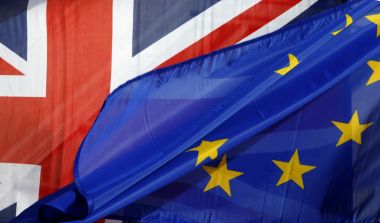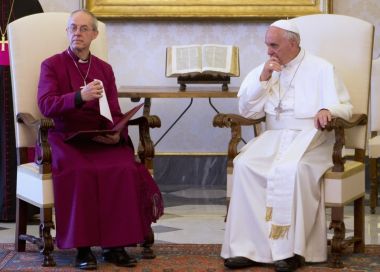EU Referendum: Is it as simple as Catholic vs Protestant?

There's an entertaining and good natured dispute going on about the UK's membership of the EU. Sadly, I'm not talking about the debate as a whole, which is turgid and stuck in recriminations around GDP and immigration statistics, when it could have been so much more – a battle of big ideas about democracy, sovereignty and the future of the UK.
Instead the enlightening debate has broken out between two our our most astute religious commentators. It began with an article in the Guardian by Giles Fraser, entitled, "Brexit recycles the defiant spirit of the Reformation." In it, Fraser recounts how the 16th century Reformation in England both represented and further engendered a spirit of independence, democratic participation and freedom that he says is alive and well in the campaign for the UK to leave the EU.
Opposing the party line of the EU places Brexiteers in the line of the Protestant Reformers, says Fraser. "Against this, there are those of us who protest," he claims, "against our laws being crafted by some foreign power, beyond the control of our domestic parliament."
It sounds like a plausible argument. Then enters one of the most erudite and well respected scholars of the Reformation, Diarmuid MacCulloch, to protest (so to speak). Writing for The Conversation, Professor MacCulloch explains how, "It's Remain not Leave that captures the independent spirit of the Reformation."
"Remainers are the people who resist breaking the natural, wider ties in our continent, he argues." True, they know the system needs radical reform... but once the corruption and the mistakes have been remedied, the prospect then as now is to look to a new continent-wide unity, not a muddle of division and weakness."
Both pieces are worth reading in full. They open up the debate in a way that secular politics has failed to do so far. While discussions about economics and immigration are important, they don't get to the heart of the issue as to whether the UK should remain in the EU. They don't speak fully about the key to the whole question – identity.
Even though much of Europe is now strongly secular, we can't escape the religious heritage we have been bequeathed. The research cited by Fraser seems to show that, "People from traditionally Protestant countries are less likely to support European unification compared to those from traditionally Catholic countries."
This instinctively makes sense. While believing Christians may now be in a minority across Europe, the cultural inheritance of Protestantism and Roman Catholicism hasn't been shed. In northern Europe, both Norway and Switzerland are outside the EU. When you add the persistent Euroscepticism of the UK into the mix (which is unlikely to dissipate even after the referendum) it begins to look like the Protestant north of Europe is aping the behaviour of its ancestors in removing themselves from outside control.
The obvious outlier is Germany, the home of the Lutheran foundations of the Reformation and the beating heart of the European Union. Yet Germany's enthusiasm for the European project can also be explained by its economic dominance of the continent (it has become the world's fourth biggest economy since the foundation of the EU, despite the devastation of the Second World War). It's also worth recognising the peace which has been achieved since the foundation of the EU, after three wars between Germany and France in less than 100 years.
The theological difference between Protestantism and Roman Catholicism is simple yet profound. To caricature for a moment: for Catholics, the Church itself plays a key role in calling individuals to salvation, through the sacraments. For Protestants, salvation and therefore truth are worked out by the individual via her reading of the Bible.
This theological conviction spilled over into the political realm. The 39 Articles of the Church Of England, which codified the reformed catholic faith of Anglicanism, say that the Bishop of Rome (ie the Pope) "hath no jurisdiction" in England. Included in the same article is an indication of where Cranmer saw true power lay. "The sovereign has the chief power in the realm of England and his other possessions. The supreme government of all in this realm, whatever their station, whether ecclesiastical and civil, and in all matters, belongs to him and is not, nor ought to be, subject to any foreign jurisdiction." In other words, it wasn't just spiritual power that was being wrested away from overseas, but temporal power too. It is easy to see why Brexiteers cleave to this historic idea.

Roman Catholicism, on the other hand, has been integral to the creation and expansion of the EU. The way in which its doctrine allows for both spiritual and temporal power to cross national borders is immediately obvious in the name 'Catholic.' It means "universal." If the Roman Catholic Church is, "The sole Church of Christ, which in the Creed we profess to be one, holy, catholic and apostolic," as the Catechism puts it then there can be no national borders to this faith.
In his excellent recent essay for Theos, A Soul For The Union, Ben Ryan argues that since its outset, the EU has been influenced by Catholic Social Thought. "The early European project had a profound sense of its own identity, one that was fundamentally moral and based on the principle of solidarity. It was, at least then, a conception which was intimately tied up with a vision drawn from Christian, and particularly Catholic political and social theory."
None of this is to suggest that individuals will vote to leave or remain in the EU on the basis of their faith alone. Yet it points to a fascinating difference in the way different parts of Europe perceive themselves. The debate over EU membership isn't as simple as Protestant vs Catholic, but that centuries old divide (which is being increasingly bridged by leaders from both sides) gives us a clue as to which way the vote may go, and why.
Follow Andy Walton on Twitter @waltonandy











